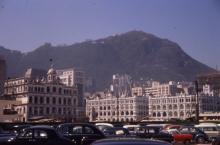On January 23, the Japanese put us into the hold of a ferry to take us (one hour trip.) to the internment camp they had prepared for us.
After we left the wharf the children and some of the mothers were permitted on deck. We could see a lot of destruction on shore and every fishing boat or ferry boat was sunk. We saw lots of masts above water or half sunk boats.
Finally, we reached the other end of the Island. Our ferry couldn’t get close enough to shore so we had to climb over the railing of our boat and the one drawn up against ours. People, bedding, boxes, bags and babies were all handed across the narrow gap. Upon reaching shore, we again walked the quarter of a mile to the camp where the gate was closed behind us.
This camp was on the Stanley Peninsula. This peninsula is on the southeast end of Hong Kong Island about 12 miles away from the city. The British had built a large prison here with modern homes for the prison wardens, a prison warden’s club house, and homes for the Indian police who guarded prisoners. The prison warden’s homes and clubhouse became the American quarters. The Chinese College Prison guard’s homes were the British quarters and one smaller building was given to the Dutch. The Japanese called us their B-A-D internees, (British, American and Dutch.
We were given a rather large former bedroom for our family. We had a double bed, a single bed and an army cot for the seven of us. We also had a wardrobe and buffet in the room. We were proud of the fact that we had so much furniture. Many people had nothing. Our dishes consisted of a frying pan, pie tin, a cracked vegetable dish and a collection of empty tin cans. One day Laura Lou found a granite cup in the garbage can which she was very glad to have because it did not leak. We each had a spoon to eat with, but some people made little paddles of wood and used them for spoons.
We were lucky and thankful to have as much bedding as we did as we had no mattresses. It gets quite cold in Hong Kong, for about six weeks in winter. During this time we were cold all the time as we had no fuel to heat our rooms. We had one window pane shattered by a bullet which also let in plenty of cold air.
St. Stevens College for Chinese boys was located next to the prison with the dormitories and professor’s homes. All these buildings, except the prison were enclosed with barbed wire entanglements for our camp. It was not large, about 3 blocks wide and 5 blocks long. There were about 2800 internees, about 425 American, 68 Dutch, and the rest British. No soldiers were interned with us. No Chinese or Japanese were allowed in camp except the ones who had charge of us.
We had running water all the time and in the beginning of March we had electric lights and the use of a few stoves.
We washed our clothes in the bath tubs, in cold water with as little soap as possible because we did not know when we would get the next piece of soap.
The Japanese sent us our food raw which we had to cook ourselves. Each person had about 7.6 ounces or ¾ cup of rice, 4 ounces of meat, and 2.89 ounces of vegetables a day. We had some flour, sugar, salt, soy beans and peanut oil.
For a while in March we had practically no salt, so some men risked their lives and went through the barbed wire fence to get ocean water to boil our food in.
The flour was increased in May to about 8 ounces. All weights were gross weight, that is including bone of meat and tops and dirt on vegetables. Before May, we each got about 5 small slices of bread a week, but after the flour was increased we got about 5 ounces of bread a day baked by our cooks in camp. This was good bread even without butter or jam. We seldom saw sugar because the cooks used most of it in food.

